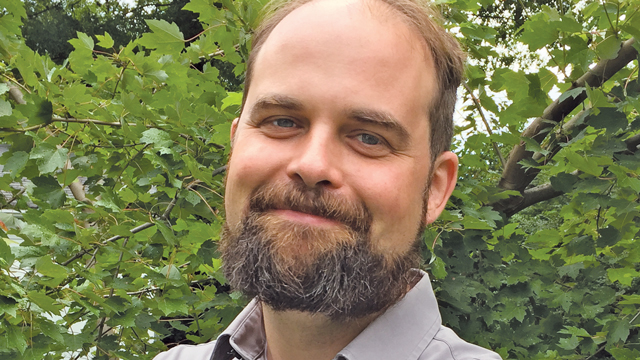It was the summer of 2020, the pandemic was in full swing, and once again I found myself in our downstairs bathroom, plunger in hand. While thankfully the quarantine had spared my family from getting sick, our 70-year-old plumbing just couldn’t keep up with the four of us being home all day, every day. At least once a week I’d be called to duty, unclogging our humble toilet. It was during one of these sessions, hands on the plunger, having just calculated the optimum amount of force to do the job with minimal splash back, that my then 13-year-old popped their head into the bathroom and said, “Dad, I’m trans.”
I was not expecting to have this conversation at that particular moment. The best I could manage was, “Wow. Okay. I love you, and I really want to talk more about this with you, but can you give me a couple of minutes?” I quickly finished in the bathroom, went out to the living room, and sat down with my child and my wife Kat. It was then that my child told us that they were non-binary (not identifying as either male or female), and that we should use they/them pronouns for them, use words like “child” or “kid” when referring to them, and that they’d like to be called a different name. We told them we loved them, would always love them, and would support them any way we could.
Pronouns and name changes were the easiest part. Kat and I made it clear that we would never use the wrong pronouns intentionally or use the wrong name on purpose, but that our brains were old and to be patient with us as we established new habits. We made a deal that if they wouldn’t get mad when we made mistakes, we wouldn’t get mad when they corrected us. In a surprisingly short period of time – just a couple of weeks – using the new words felt just as natural as if we’d been using them for their entire life. I’m glad that I didn’t have to name myself at fourteen. I would have picked something out of a fantasy novel or comic book.
Since that day, I’ve had to learn new words. I’ve had to reframe myself from a “father of daughters” to a “father of kids.” I’ve had to rethink my understanding of gender and biology. We’re told that gender is a societal construct, which is true, but what I didn’t grasp was how much this particular societal construct has an effect on one’s brain. I’ve had to imagine what it would be like to wake up every day in a body that didn’t feel like my own.
For the harder stuff, we’ve leaned on experts: Our family pediatrician, mental health professionals, and pediatric endocrinologists have helped guide our family on getting the most appropriate care for my kid. Different trans kids need different things, which is why it’s so important that decisions are made by families and their doctors so trans children can get the kind of support they need.
A thing to remember is that trans kids are kids. Kids will choose to start important conversations when you’re plunging a toilet. Kids will make mistakes and learn from them. Kids have to learn to define themselves; they have to try new things and find what fits them. Kids have to be kids.
A trans kid has to do all of those things, but also so much more. Because puberty is permanent, some trans kids have to make decisions about their lives and bodies earlier than most of us. I’m forty-one years old, I’m a cis man (a person whose gender identity and sex assigned at birth are the same), and I still struggle with who I am. I certainly wasn’t capable of assertive self-definition at sixteen; I’m awed by how strong trans kids can be. These kids shouldn’t go through these challenges alone. They should have families who love them, guided by expert physical and mental health professionals.
They don’t need to be feared. They don’t need to be mocked. They don’t need to be punished or targeted for political gain. Figuring out who you are is hard enough without someone dictating where you can and cannot pee or which sport you can play. Showing a fellow human the basic respect of using the name they wish to be called shouldn’t be a political act – it’s just common courtesy.
My kid is proud of who they are and told most of their friends and family members themselves. But for those who I tell, the phrase I hear over and over again is, “They’re lucky to have you as parents.” This makes me incredibly sad. Kat and I aren’t remarkable. We’re just parents who love our kids. How messed up is it that showing your child even the minimal amount of love and support is considered worthy of such high praise?
I worry about my child facing the world outside of our metropolitan bubble. People can fear what they’ve never been exposed to, and the genius of cities is that they expose us to so many different and remarkable humans. I hope that my writing has exposed you to a family you might not have seen or heard from before. I wanted to share a little bit of my story and express publicly just how much I love my trans kid. I’m still learning all the time, and I hope you continue to do the same.




